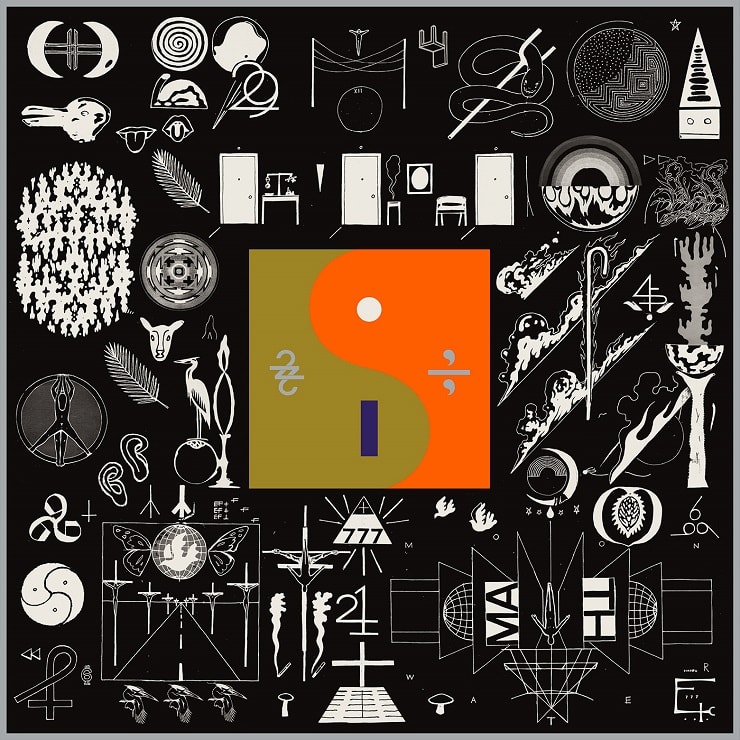Where does an artist go after winning a Grammy and simultaneously becoming the go-to punchline poster boy for sleepy, folk-leaning "intellectual" music? Bon Iver's Justin Vernon answered unexpectedly when he took five years off to focus on other projects: he released albums with side-projects like the Shouting Matches and Volcano Choir, started the Eaux Claires Music & Arts Festival and, perhaps most critically, collaborated with and contributed to the work of sonic masterminds like James Blake and Kanye West.
Their influence is strong on 22, A Million. Opener "22 (OVER S∞∞N)" starts with a droning vocal sample before Mahalia Jackson's pitch-shifted voice croons that "It might be over sooooon." It's the first of many samples on the new Bon Iver record. For emphasis, I'll repeat that: Samples. On a Bon Iver record.
It's an inspired move by Vernon, and the crux of 22's success; by introducing the vocal chopping, pitch-shifting and over-driven, staticky crackle so central to West and Blake's captivating music, he's side-stepped the limitations inherent to folk music and blown up expectations of what constitutes Bon Iver's sound.
Vernon's stoic minimalism is still intact here. When he joins the sampled Jackson on "22 (OVER S∞∞N)," the song blooms, just a few key ingredients — including a perfectly placed, plaintive sax solo — stretching out in swathes of space, while the distortion-laden "10 d E A T h b R E a s T ⚄ ⚄" piles layers of Vernon's blown-out voice over little more than a chugging tom, rimshots and a gauzy, barely audible keyboard chime.
It's not an entire sonic reinvention. "29 #Strafford APTS" starts fairly straightforwardly until about a minute in, when Vernon's warble is stretched and warped as though played by a malfunctioning turntable. The sax-led "____45_____" starts similarly simply, but the flutter of the saxophone around the 55-second mark is an omen that further fracturing is to come; in the ensuing 40 seconds, the sonic shards sparkle and crackle with sonic charge, before a gentle banjo denouement brings the track to a close. "8 (circle)" is perhaps the closest Vernon comes to the Bon Iver sound of yore, pretty and a little long, but it still fits here, acting as a break after the shifting sands of "21 M♢♢N WATER."
22, A Million isn't a game-changer; too many other songwriters — Kanye, Blake, Thom Yorke, Lil Wayne, Sufjan Stevens, much of the electronic music world — have buried or blown their voice out before as a means to escape or transcend genre boundaries. Yet in the context of Bon Iver, it's an emphatic step forward, a gorgeous album that, rather than running from it, reflects our fractured world back at us.
(Jagjaguwar)Their influence is strong on 22, A Million. Opener "22 (OVER S∞∞N)" starts with a droning vocal sample before Mahalia Jackson's pitch-shifted voice croons that "It might be over sooooon." It's the first of many samples on the new Bon Iver record. For emphasis, I'll repeat that: Samples. On a Bon Iver record.
It's an inspired move by Vernon, and the crux of 22's success; by introducing the vocal chopping, pitch-shifting and over-driven, staticky crackle so central to West and Blake's captivating music, he's side-stepped the limitations inherent to folk music and blown up expectations of what constitutes Bon Iver's sound.
Vernon's stoic minimalism is still intact here. When he joins the sampled Jackson on "22 (OVER S∞∞N)," the song blooms, just a few key ingredients — including a perfectly placed, plaintive sax solo — stretching out in swathes of space, while the distortion-laden "10 d E A T h b R E a s T ⚄ ⚄" piles layers of Vernon's blown-out voice over little more than a chugging tom, rimshots and a gauzy, barely audible keyboard chime.
It's not an entire sonic reinvention. "29 #Strafford APTS" starts fairly straightforwardly until about a minute in, when Vernon's warble is stretched and warped as though played by a malfunctioning turntable. The sax-led "____45_____" starts similarly simply, but the flutter of the saxophone around the 55-second mark is an omen that further fracturing is to come; in the ensuing 40 seconds, the sonic shards sparkle and crackle with sonic charge, before a gentle banjo denouement brings the track to a close. "8 (circle)" is perhaps the closest Vernon comes to the Bon Iver sound of yore, pretty and a little long, but it still fits here, acting as a break after the shifting sands of "21 M♢♢N WATER."
22, A Million isn't a game-changer; too many other songwriters — Kanye, Blake, Thom Yorke, Lil Wayne, Sufjan Stevens, much of the electronic music world — have buried or blown their voice out before as a means to escape or transcend genre boundaries. Yet in the context of Bon Iver, it's an emphatic step forward, a gorgeous album that, rather than running from it, reflects our fractured world back at us.
